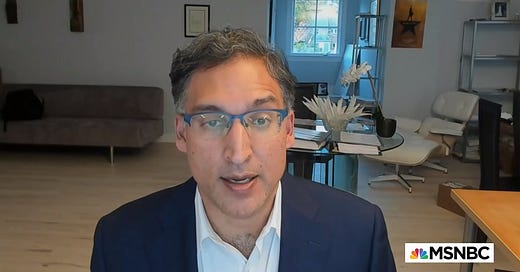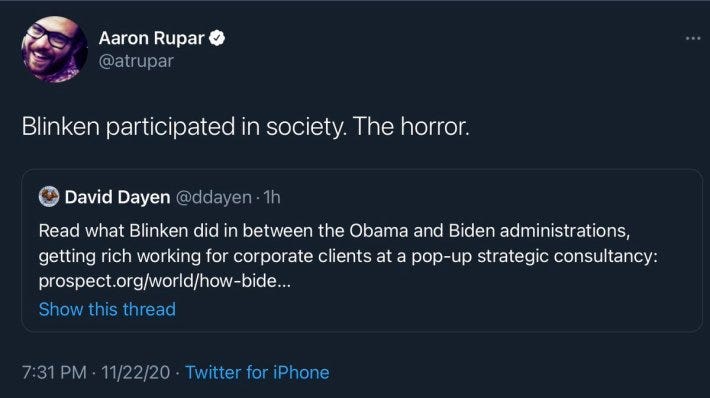Just Another Day at the Office
Neal Katyal used to work for Barack Obama. Now he defends corporations' right to use slaves.
Today the Supreme Court heard legal arguments in two consolidated cases called Nestlé USA v Doe I and Cargill, Inc. v Doe I. The cases are very simple: the "Does" say that the giant multinational corporations Nestlé and Cargill used them as slaves on cocoa plantations in Mali (technically, the claim is that the companies "aided and abetted" their slavery, forced labor, and human trafficking, but come on).
The specific legal facts of both of these cases are not particularly relevant to this blog. It is well reported that companies like Nestlé and Cargill use slaves in foreign countries overseas and it is almost certain that they would do the same thing in the U.S. if they thought they could get away with it. The outcome of these cases will determine whether or not they get away with it overseas, as the petitioners are foreign citizens trying to sue U.S. companies in U.S. courts for crimes committed outside of the U.S.
Because Nestlé and Cargill are very rich and profitable companies (easy to make money when you are using slaves), and they have very good lawyers. In this particular case, their lead guy is a man named Neal Katyal.
Neal Katyal is not a name that the average American would know. He is a member of the niche-famous political insider class, a group of people who largely determine how the country is run and make decisions on topics like "how many people can we let die because they can't afford insulin without provoking widespread unrest" and "is slavery legal for chocolate companies to do." Katyal's specialty is arguing cases in front of the Supreme Court; at one point in the Obama Administration, he served as the Acting Solicitor General of the U.S., the government's top lawyer for all cases it's involved in that make it to that level. Now he is a partner at Hogan Lovells, the 11th largest law firm in the world, where one of his clients is Nestlé, a company that, let me reiterate, is using slaves.
Here is a short synopsis of Katyal's argument so far (this is a paraphrase of Supreme Court Justice Elena Kagan's questioning of Katyal earlier today, which you can read/ hear more highlights of in Mark Joseph Stern's very comprehensive thread here):
This is Neal Katyal's job. It is his job, which he is usually very good at, to stand before the Supreme Court and win cases for his clients, which in this case is a company who owns slaves. I'm reiterating that point over and over again because it is an important example of how things work. Something we've seen over the past few weeks is the sentiment that work in the private sector, which many former public servants dip into and out of as their careers progress, should not be judged harshly when those people return to public life. For example, this tweet about Biden's nominee for Secretary of State Anthony Blinken.
Blinken, to his credit, has never directly defended a corporation that uses slave labor in front of the Supreme Court, though his record, and those of several other Biden nominees, are far from clean. But unfortunately, the above tweet from Vox staffer Aaron Rupar is ultimately right. Katyal's actions, like Blinken's are basically just participating in society, because this is how society works. Katyal is a frequent, prolific guest on MSNBC; he wrote a well-received book called "Impeach: The Case Against Donald Trump." Here he is also participating in society by reiterating his support for the Movement for Black Lives.


It's extremely possible that we will see Neal Katyal again on the other side of the table. Perhaps a vacancy in the Solicitor General's office opens up after the midterms, perhaps future presidential candidate Kamala Harris decides to replace Biden's pick for Attorney General. In such a role, he will be charged with the legal preservation of an institution that is meant to keep its constituents safe, and healthy, and free. The people across the table from him will likely represent the corporations who have a vested financial interest in making sure that slavery still exists. Katyal will know their arguments well, because he used to make them himself. But the problem is, if the people on either side of the table are effectively the same, only one group of them is actually doing their job. By now it should be clear which group that is.







